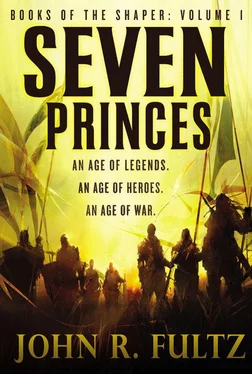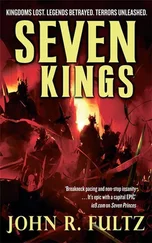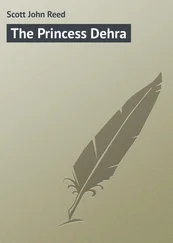John Fultz - Seven Princes
Здесь есть возможность читать онлайн «John Fultz - Seven Princes» весь текст электронной книги совершенно бесплатно (целиком полную версию без сокращений). В некоторых случаях можно слушать аудио, скачать через торрент в формате fb2 и присутствует краткое содержание. Жанр: Фэнтези, на английском языке. Описание произведения, (предисловие) а так же отзывы посетителей доступны на портале библиотеки ЛибКат.
- Название:Seven Princes
- Автор:
- Жанр:
- Год:неизвестен
- ISBN:нет данных
- Рейтинг книги:5 / 5. Голосов: 1
-
Избранное:Добавить в избранное
- Отзывы:
-
Ваша оценка:
- 100
- 1
- 2
- 3
- 4
- 5
Seven Princes: краткое содержание, описание и аннотация
Предлагаем к чтению аннотацию, описание, краткое содержание или предисловие (зависит от того, что написал сам автор книги «Seven Princes»). Если вы не нашли необходимую информацию о книге — напишите в комментариях, мы постараемся отыскать её.
Seven Princes — читать онлайн бесплатно полную книгу (весь текст) целиком
Ниже представлен текст книги, разбитый по страницам. Система сохранения места последней прочитанной страницы, позволяет с удобством читать онлайн бесплатно книгу «Seven Princes», без необходимости каждый раз заново искать на чём Вы остановились. Поставьте закладку, и сможете в любой момент перейти на страницу, на которой закончили чтение.
Интервал:
Закладка:
Their wings carried them west now, as well as south, and the forests sank into deep valleys and rose across furrowed ridges. The land gradually fell back to sea level as the mass of trees grew thinner. By late afternoon they soared over the windy brown steppes of Mumbaza. Somewhere ahead, perhaps closer than she imagined, lay the capital city atop its pearly cliffs, overlooking the blue sea as it had for centuries. Mumbaza was among the world’s most ancient kingdoms; despite the dangers ahead, she thrilled at the prospect of walking its ancient streets.
Iardu changed his course, and she was bound to follow. He dove toward the flat heat-browned grassland. A village of domed huts passed below, and herds of horned cattle. Dark-skinned Mumbazans walked trails among the grass with tufted spears, talismans of gold and copper gleaming on their chests. Another village nestled on the edge of a lake that glistened like a dark jewel. The swarthy villagers gathered here, some in crimson cloaks and hats of woven feathers. Dusky children gamboled between white sheep and black goats.
Eventually the Iardu-hawk alighted on the leafless branch of a twisted old tree near a cluster of round huts. Sharadza perched herself there beside him, blinking her avian eyes at the scene below. Here was the smallest of the villages yet. A single herd of goats gnawed the grass on a nearby hill. The golden steppe stretched out in all directions.
The two hawks sat on their branch and watched a few children run among the hide-walled huts, where the smoke of cookfires rose from clay chimneys. Sharadza sat patiently next to Iardu, although she longed to ask him what they were waiting for in this unlikely place. Where was the one they came to seek? This looked like no place a great sorcerer would live, but then what did the lair of a sorcerer look like? She rustled her feathers, trusting in the Shaper’s guidance. The sun sank toward the flat horizon, an orange ball of flame singing the steppe.
The goats moved off the hill and came slowly toward the cluster of huts. A man walked behind them with a crooked staff, the legendary tool of the herdsman. As he drew near, he looked right at the two hawks with his keen dark eyes. His skin was ebony, shining with sweat, and his thick hair tied into a mass of braids reaching the middle of his back. A loincloth and moccasins were his only garb, apart from the golden armbands, the copper amulets about his neck, and the jade bangles hanging from his pierced ears. His forehead was tall, his muscles lean and tight under smooth skin. His nose was broad and flat above ample lips, and the marks of ritual scarring formed zig-zag patterns on his chest and shoulders.
He led ze= width="2the goats into a pen, his eyes ever returning to the tree. When he closed the pen’s gate, he came to stand before the tree and spoke to the hawks in the language common to all Men, accented in the lilting dialect of Mumbaza.
“Go away, hawks,” he said. “Your kind bring only trouble.”
Iardu melted from the branch and stood now as himself before the Mumbazan. Sharadza did the same, standing beside him in a traveling robe of green and black.
“Khama,” said Iardu. “How are you, old friend?”
Khama did not return Iardu’s smile. His eyes glittered like black pearls.
“Why do you come here, Shaper?” he said. “You are not welcome.”
“I come only because I have to,” said Iardu. “We must speak. This is Sharadza, Princess of Udurum.”
Khama turned away. “I cannot welcome you here, knowing what you are. You should have stayed in your northern kingdom.” He walked away toward the cluster of huts, where three curious children stared at the strangers. Iardu walked after him, and Sharadza followed.
“This is no way to greet a friend,” said the Shaper. “Surely you remember the things we’ve shared.”
Khama stopped and turned to face him. “I choose not to remember,” he said, voice low so the children could not hear his words. “I am only a man now, Iardu. These are my children, my goats, my land. I have found peace here. Why must you disturb it?”
“All of these things are beautiful,” said Iardu. He waved at the children, who responded with white grins. They shuffled shyly among the huts.
A voice called from one of the structures, and a lean Mumbazan woman looked out from its doorway. “My wife calls,” said Khama. “You must go. Please. Leave me to this simple life I have chosen.”
“You are a man of peace,” said Iardu. “I respect that. We do not bring you trouble, Khama. We bring a warning. War brews in the south. All that you love is in danger. Mumbaza is the fulcrum in a struggle for power. Elhathym has returned.”
Khama slammed the butt of his herding staff into the ground, raising a cloud of dust. “I do not know this name.” He stared at Iardu as if he might strike him.
“You do,” said Iardu. “ Remember…”
A cloud fell across the glow of Khama’s eyes, and he looked into the blue sky. He sighed, a long exhalation of regret, remorse, or perhaps weariness. The goats in their pen made helpless bleating noises. The children giggled and rubbed round stones across their palms.
Khama turned his eyes to Sharadza for the first time. His wife still stared from the doorway of their home. “Come and share food with us,” he said, and walked toward his family.
Sharadza shared a quiet glance with Iardu. His face said, Trust me . She decided s Sh›
“My oldest son Kuchka is out with our second herd,” said Khama. “We have forty-seven good sheep. Wool brings a high price at the capital.”
They served generous portions to the visitors, and Sharadza was famished. Flying all day took as much energy as walking all day. She ate well, but not enough to embarrass herself. Iardu did the same, and she knew he would rather be drinking wine than milk. Khama’s family spoke only Mumbazan, so they understood nothing of what Iardu told his old friend.
He told the herdsman of the recent events in Yaskatha, the usurping of the throne by the tyrant sorcerer, the murder of the Udurum Prince, the alliance of Ianthe and Khyrei with Elhathym and his new throne, and the war that was coming. As they spoke the sun began to set, and Kuchka returned with the sheep, herding them into a second pen near the goats. He came into the hut and ate the rest of the meal, his eyes darting back to Sharadza every few moments. A handsome lad, strong and well built like his father. If Khama was a sorcerer, then Kuchka would be too. But did he know anything about the ancient legacy of his father? She guessed not, since Khama lived here in the bosom of domestic bliss.
This man had found the happiness that Iardu never was able to grasp. Emi was a beautiful woman, a perfect wife and mother. Sharadza felt a pang of guilt for bringing Iardu back into Khama’s life. Yet what else could they do but seek aid wherever it could be found? What history did Khama and Iardu share? There was no doubt he came of the Old Breed, yet was trying to forget it. Like the Sea Queen, who had forgotten and carved her own paradise beneath the waves. Perhaps in a few more years Khama would have forgotten his true nature as well and truly become the simple man he so wanted to be. But Iardu had done something, looked into his eyes with a certain intensity, and it had all come rushing back to him.
Khama remembered… but would he help?
A sliver of moon stood over the prairie and stars blazed in the black sky. They walked with Khama to stand near the old tree. Talismans of bone and wire hung from its branches. A gentle wind blew across the steppe, dispelling the heat of the day.
“If we can remove Elhathym from his Yaskathan throne,” said Iardu, “there will be no chance of war with Mumbaza. Khyrei is far away. Fire and blood will not spill here.”
Читать дальшеИнтервал:
Закладка:
Похожие книги на «Seven Princes»
Представляем Вашему вниманию похожие книги на «Seven Princes» списком для выбора. Мы отобрали схожую по названию и смыслу литературу в надежде предоставить читателям больше вариантов отыскать новые, интересные, ещё непрочитанные произведения.
Обсуждение, отзывы о книге «Seven Princes» и просто собственные мнения читателей. Оставьте ваши комментарии, напишите, что Вы думаете о произведении, его смысле или главных героях. Укажите что конкретно понравилось, а что нет, и почему Вы так считаете.












